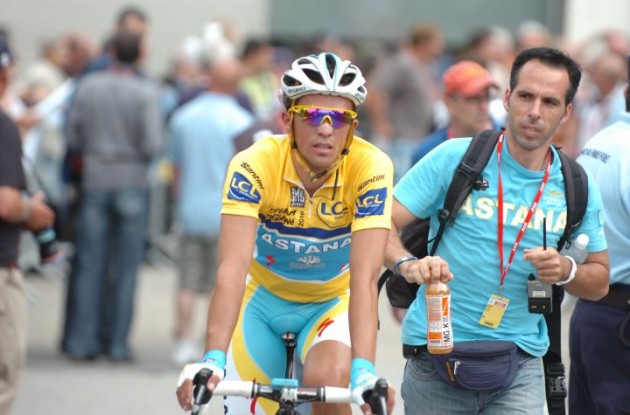Alberto Contador Submits Final Defense in Doping Case
Team Saxo Bank-SunGard's Alberto Contador submitted his final defense to overturn a proposed one-year ban for a positive doping test during the 2010 Tour de France.
Team Saxo Bank-SunGard's Alberto Contador submitted his final defense to overturn a proposed one-year ban for a positive doping test during the 2010 Tour de France while he was riding for Team Astana.
Contador submitted more documentation to Spanish cycling authorities to demonstrate his positive test for clenbuterol from contaminated meat was due to "no fault or negligence" on his part.
Contador could be stripped of his third Tour title and miss this year's race if the one-year suspension is upheld. The standard doping penalty is a two-year ban, but the Spanish cycling federation opted to go with one year.
"With the documents presented and the two new points we've introduced there's hope this [decision] changes," Contador told Spanish national radio Monday evening. "The rule says the athlete must show responsibility and negligence for a sanction to be applied."
The clenbuterol was found in a sample taken July 21, a Tour rest day. Traces of the drug were found in tests performed over the next three days, but the Spanish disciplinary committee dismissed those failed tests as clenbuterol takes several days to disappear from a person's system completely.
Contador submitted another 35 pages to the 90 he previously presented with an emphasis on supporting both the International Cycling Union's and the World Anti-Doping Agency's regulations that suggest a ban can be eliminated if the athlete shows no intention to cheat, and unintentional consumption of a performance-enhancing drug.
Part of Contador's defense is the case of French tennis player Richard Gasquet, who avoided a ban after proving he inadvertently ingested cocaine after kissing a woman at a nightclub.
A final ruling is expected later this week, but that decision can be appealed to the Court of Arbitration for Sport by Contador, the UCI or WADA.
"An athlete tested positive in Mexico, where clenbuterol is used in cattle, but in the European Union meat goes through more controls and it's illegal to fatten cattle using this substance. I could never expect that meat to be contaminated," Contador said.
Clenbuterol has been outlawed since 1996 and it showed up only once in 83,203 animal samples tested by EU countries in 2008 and 2009, with zero positive cases in Spain from 19,431 samples analyzed.
Contador's team has also called on Spanish cycling's disciplinary committee to take into account "the principle of equality" when it comes to analyzing athlete's samples.
Contador's clenbuterol reading was discovered at a Cologne lab in Germany, which is one of just four of the world's 34 accredited anti-doping laboratories with the cutting-edge tools to have detected the minute traces of clenbuterol. Clenbuterol is considered a zero-tolerance drug by WADA for its ability to build muscle and burn fat.
Contador said he received a message of support from Barcelona coach Pep Guardiola, who also fought a similar doping case as a soccer player in Italy.
"At the beginning this was a nightmare, but now I just feel disappointment," Contador said. "But I still have hope."









